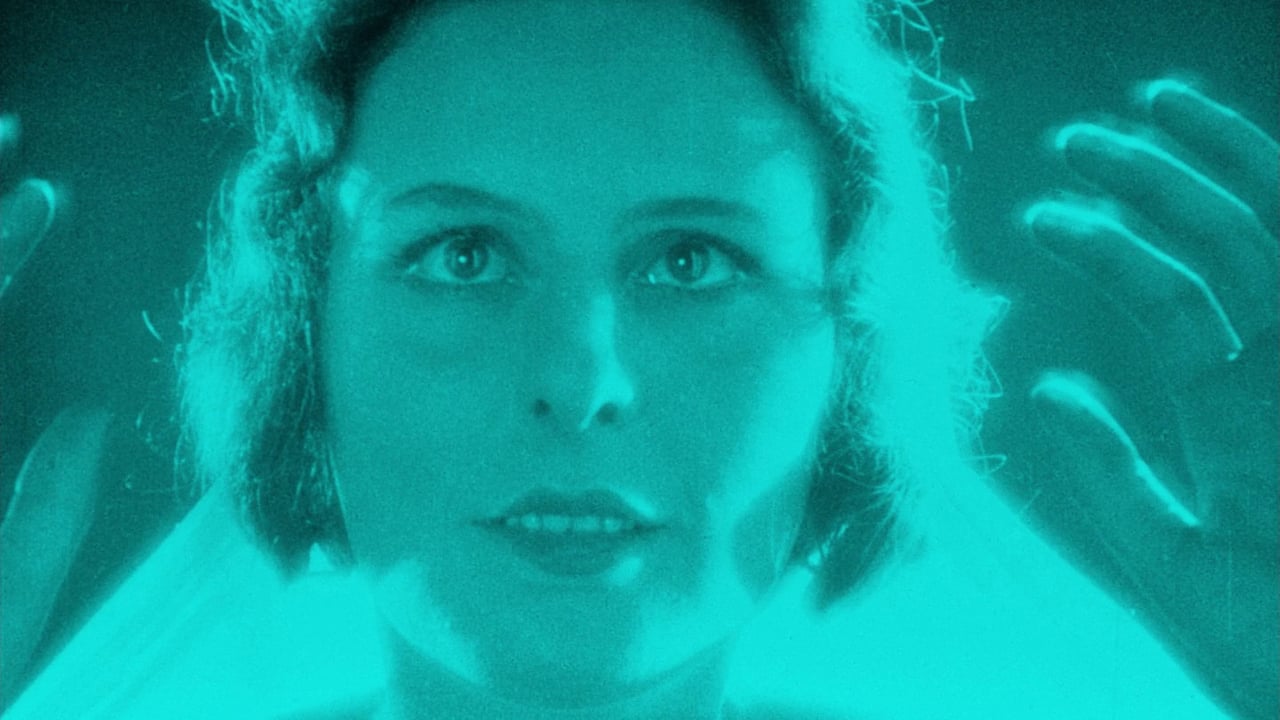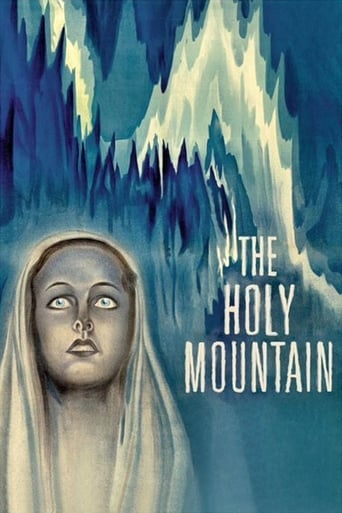



Let's be realistic.
everything you have heard about this movie is true.
View MoreBest movie ever!
The best films of this genre always show a path and provide a takeaway for being a better person.
View More"Der heilige Berg" or "The Holy Mountain" is a German silent film in black-and-white from the year 1926, so this one has its 90th anniversary this year already. It was written and directed by German filmmaker Arnold Fanck, a man who is mostly known for his mountain-themed films from the first half of the 20th century. The cast includes Ernst Petersen, a regular in Fanck's films, Leni Riefenstahl before her days as a propaganda filmmaker, and Luis Trenker, a famous mountain climber who turned to acting. The film runs for 100 minutes approximately, but I have to say that in terms of the story and the plot 50 minutes would have been more than enough. The story is not the greatest strength here about a pair of climbers and a woman who stands between them, but this is a common problem with Fanck's works. However, his biggest strength also keeps this film from being a really boring or disastrous watch. Visually, it is way ahead of its time, no doubt about it. The snowy landscapes are a joy to watch and I can see why this film still appeals to people today. There are some genuinely beautiful shots in here. However, this is not enough to make up for the deficits in terms of story-telling and my overall verdict for this movie from between World Wars I and II is a negative one. Thumbs down and I do not recommend the watch. The good thing for foreign audiences is that this film also exists with English intertitles if they really want to see it. But I cannot really support this decision.
View MoreThe dancer Diotima (Leni Riefenstahl) meets the engineer and skier Karl (Luis Trenker) in his cottage in the mountains and they fall in love for each other and have a love affair. When Karl's young friend Vigo (Ernst Petersen) meets the dancer after a presentation and she gives her scarf with a smile to him, the infatuated Vigo mistakenly believes she is in love with him. Karl sees Diotima innocently caressing Vigo and he believes that Diotima is betraying him with his friend. Karl decides to commit suicide and invites Vigo to climb the dreadful Santo Mountain North face during the winter thaw with him. His best friend joins Karl in a tragic journey."Der Heilige Berg" is a melodramatic and tragic story of a triangle of love among a dancer that loves the sea; a skilled skier and engineer that loves the rock; and his young friend that loves the dancer. The plot is absolutely naive in 2010, but after all this is a 1926 film when the society had other moral concepts. The infamous Leni Riefenstahl, who directed the Third Reich's propaganda for Hitler one decade later, performs the dancer and pivot of the tragedy. Her dance is weird and clumsy but this is a silent movie and the viewer never knows what she was listening while dancing. If the romance is not interesting in the present days, the cinematography and the camera work are stunning considering the size, weight and technical resources of the equipment in this period. All shots outdoor were actually made in the mountains, including the ski race and the scene on the cliff, in the most beautiful parts of the Alps over the course of one and half years. My vote is seven.Title (Brazil): "A Montanha Sagrada" ("The Holy Mountain")
View MoreMost famous now, certainly, for containing the first starring role from actress and dancer, later director Leni Riefenstahl, this was director Fanck's second "mountain film" and in late 20s Germany probably didn't really stand out amongst the many other examples, including Alfred Hitchcock's now-lost The Mountain Eagle released the same year. And Riefenstahl's performance isn't really enough of a reason to see the film unless one has a significant interest in her; she's not really that good, rather amateurish here, and her dancing though decent enough seems entirely of the pagan/ritualistic type and gets rather tedious after a while.It's an old story, too -- the love triangle, in this case a mistaken one as Diotima (Riefenstahl) falls instantly in love with mountaineer/ski instructor Karl (Luis Trenker, magnetic and giving far and away the best performance here) only to have his younger friend Vigo (Ernst Peterson) fall for her. Tragedy is the end result, but not before we get to see an awful lot of great mountain climbing, cross-country skiing, and ski jumping footage. It's the photography and action sequences that make the film worth a view, not the stilted storyline. Curiously the film seems to have a rather pagan, earthy attitude towards God and nature, only to have that disrupted in the final frame by a very Christian-seeming "FAITH".The Kino DVD is quite beautiful and alternates between bluish and sepia tinting, but I have to take issue with the music, apparently scored and performed specifically for the film by a small ensemble; it's nice enough on its own but doesn't fit the Teutonic grandeur or wildness to my ears...more of a Buster Keaton or silent western score, it seemed to me. My advice is to turn down the music and crank your own Wagner, Bruckner or perhaps best of all, Mahler.
View MoreGerman filmmaker Arnold Fanck single-handedly invented an entire movie genre: the mountain film. This refers not to mountain-climbing movies in general, but to a specific type of movie in an Alpine setting. A 'mountain film' depicts the experiences of an athletic young Aryan man, high in the mountains, where he communes with nature and meets a beautiful blonde woman who somehow embodies both the Aryan physical ideal and the German countryside itself. Their relationship is erotic, yet has semi-mystical aspects bordering on a religious epiphany. The man learns much about himself. Sometimes (as happens here in 'Der Heilige Berg') a mountain film has two male protagonists, both athletic, who develop a rivalry over the blonde fraulein.Although Fanck invented and embodied the mountain-film genre, in the same way that Alfred Hitchcock defined the suspense film and Busby Berkeley defined the Depression-era musical, Fanck was by no means the only 'mountain-film' director. Movies in this genre have been made by directors as disparate as Hitchcock ('The Mountain Eagle') and Fred Zinnemann ('Five Days One Summer').'Der Heilige Berg' ('The Holy Mountain') features Louis Trenker as Karl, a downhill skier who loves a beautiful dancer named Diotina. (Played by Leni Riefenstahl, who is so sexy here that I can well believe that Hitler had the hots for her.) Alles ist wunderbar for Karl and his little schnitzel, until along comes the slightly younger and handsomer Vigo, played by Ernst Petersen. A triangle develops between these three. Karl decides to eliminate his rival, so with German cunning he invites Vigo to join him in a climb up the nearest Alp. At the top of the Alp, Karl pushes Vigo over a precipice... then he suddenly remembers that he and Vigo are roped together. Oops! This scene reminded me of the climax of Erich von Stroheim's 'Greed', in which one man kills another man in the middle of Death Valley, then discovers that he's handcuffed to the corpse. The difference is that in 'Greed' the two men became shackled together at the last moment, whereas (in this piece of krautwurst) Karl and Vigo were roped together before Karl gave Vigo the heave-ho, so his actions are extremely ludicrous.Anyway, in order to save himself, Karl must rescue the dangling Vigo, and the dangling plotline ... and in the process he makes a few self-discoveries.As is typical of an Arnold Fanck film, there are some exciting skiing sequences, and some splendid footage of a skiing competition. Leni Riefenstahl is photographed to excellent advantage, with some fine backlighting in her blonde hair while she flexes her gorgeous physique, but she overacts very badly here. I'll rate this movie 6 out of 10.
View More